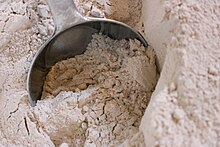пызь
Jump to navigation
Jump to search
Komi-Permyak[edit]
Etymology[edit]
From Proto-Finno-Ugric *puśnɜ.
Noun[edit]
пызь • (pyź)
Komi-Zyrian[edit]

Etymology[edit]
From Proto-Permic *pu̇ź, from Proto-Uralic *puśnɜ. Cognates include Udmurt пызь (pyź).
Pronunciation[edit]
Noun[edit]
пызь • (pyź)
Declension[edit]
| Declension of пызь (stem: пызь-) | |||
|---|---|---|---|
| singular | plural | ||
| nominative | пызь (pyź) | пызьяс (pyźjas) | |
| accusative | I* | пызь (pyź) | пызьяс (pyźjas) |
| II* | пызьӧс (pyźös) | пызьясӧс (pyźjasös) | |
| instrumental | пызьӧн (pyźön) | пызьясӧн (pyźjasön) | |
| comitative | пызькӧд (pyźköd) | пызьяскӧд (pyźjasköd) | |
| caritive | пызьтӧг (pyźtög) | пызьястӧг (pyźjastög) | |
| consecutive | пызьла (pyźla) | пызьясла (pyźjasla) | |
| genitive | пызьлӧн (pyźlön) | пызьяслӧн (pyźjaslön) | |
| ablative | пызьлысь (pyźlyś) | пызьяслысь (pyźjaslyś) | |
| dative | пызьлы (pyźly) | пызьяслы (pyźjasly) | |
| inessive | пызьын (pyźyn) | пызьясын (pyźjasyn) | |
| elative | пызьысь (pyźyś) | пызьясысь (pyźjasyś) | |
| illative | пызьӧ (pyźö) | пызьясӧ (pyźjasö) | |
| egressive | пызьсянь (pyźśań) | пызьяссянь (pyźjasśań) | |
| approximative | пызьлань (pyźlań) | пызьяслань (pyźjaslań) | |
| terminative | пызьӧдз (pyźödź) | пызьясӧдз (pyźjasödź) | |
| prolative | I | пызьӧд (pyźöd) | пызьясӧд (pyźjasöd) |
| II | пызьті (pyźti) | пызьясті (pyźjasti) | |
| *) Animate nouns almost exclusively take the type II accusative ending, whereas inanimate nouns can be used with either ending, but are more often found with type I. | |||
| Possessive declension of пызь | |||||||||||||||||||||||||||||||||||||||||||||||||||||||||||||||||||||||||||||||||||||||
|---|---|---|---|---|---|---|---|---|---|---|---|---|---|---|---|---|---|---|---|---|---|---|---|---|---|---|---|---|---|---|---|---|---|---|---|---|---|---|---|---|---|---|---|---|---|---|---|---|---|---|---|---|---|---|---|---|---|---|---|---|---|---|---|---|---|---|---|---|---|---|---|---|---|---|---|---|---|---|---|---|---|---|---|---|---|---|---|
| |||||||||||||||||||||||||||||||||||||||||||||||||||||||||||||||||||||||||||||||||||||||
| |||||||||||||||||||||||||||||||||||||||||||||||||||||||||||||||||||||||||||||||||||||||
| |||||||||||||||||||||||||||||||||||||||||||||||||||||||||||||||||||||||||||||||||||||||
| |||||||||||||||||||||||||||||||||||||||||||||||||||||||||||||||||||||||||||||||||||||||
| |||||||||||||||||||||||||||||||||||||||||||||||||||||||||||||||||||||||||||||||||||||||
| |||||||||||||||||||||||||||||||||||||||||||||||||||||||||||||||||||||||||||||||||||||||
References[edit]
- Bubrikh, Dmitry V. (1949) Грамматика литературного коми языка [Grammar of the literary Komi language] (in Russian), Leningrad: Zhdanov Leningrad State University, page 8
- L. M. Beznosikova, E. A. Ajbabina, R. I. Kosnyreva (2000) Коми-русский словарь [Komi-Russian dictionary], →ISBN, page 543
Udmurt[edit]

Alternative forms[edit]
Etymology[edit]
From Proto-Permic *pu̇ź, from Proto-Uralic *puśnɜ. Cognates include Komi-Zyrian пызь (pyź).
Pronunciation[edit]
Noun[edit]
пызь • (pyź)
Declension[edit]
Declension of пызь (soft declension, no plural)
| singular | |
|---|---|
| nominative | пызь pyź |
| accusative | пызьез pyźjez |
| genitive | пызьлэн pyźlen |
| dative | пызьлы pyźly |
| ablative | пызьлэсь pyźleś |
| instrumental | пызьен pyźjen |
| abessive | пызьтэк pyźtek |
| adverbial | пызья pyźja |
| inessive | пызьын pyźyn |
| illative | пызье pyźje |
| elative | пызьысь pyźyś |
| egressive | пызьысьен pyźyśjen |
| terminative | пызьозь pyźoź |
| prolative | пызьетӥ pyźjeti |
| allative | пызьлань pyźlań |
Possessive forms of пызь
1st singular possessive forms of пызь
2nd singular possessive forms of пызь
3rd singular possessive forms of пызь
1st plural possessive forms of пызь
2nd plural possessive forms of пызь
References[edit]
- L. E. Kirillova, L. L. Karpova, editors (2008), “пызь”, in Удмурт-ӟуч кыллюкам [Udmurt-Russian dictionary], Izhevsk: Удмуртский институт истории, языка и литературы УрО РАН, →ISBN, page 569
- Yrjö Wichmann, Toivo Emil Uotila (1987) Mikko Korhonen, editor, Wotjakischer Wortschatz [Votyak Vocabulary] (Lexica Societatis Fenno-Ugricae; Volume 21) (overall work in German), Helsinki: Suomalais-ugrilainen Seura, →ISBN, →ISSN, page 202
Categories:
- Komi-Permyak terms inherited from Proto-Finno-Ugric
- Komi-Permyak terms derived from Proto-Finno-Ugric
- Komi-Permyak lemmas
- Komi-Permyak nouns
- Komi-Zyrian terms inherited from Proto-Permic
- Komi-Zyrian terms derived from Proto-Permic
- Komi-Zyrian terms inherited from Proto-Uralic
- Komi-Zyrian terms derived from Proto-Uralic
- Komi-Zyrian terms with IPA pronunciation
- Komi-Zyrian lemmas
- Komi-Zyrian nouns
- kpv:Cooking
- kpv:Foods
- Udmurt terms inherited from Proto-Permic
- Udmurt terms derived from Proto-Permic
- Udmurt terms inherited from Proto-Uralic
- Udmurt terms derived from Proto-Uralic
- Udmurt terms with IPA pronunciation
- Rhymes:Udmurt/ɯ̈ʑ
- Rhymes:Udmurt/ɯ̈ʑ/1 syllable
- Udmurt lemmas
- Udmurt nouns
- udm:Cooking
- udm:Foods
